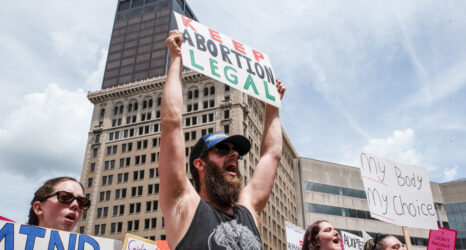
Women say ‘Wrong Way’ to Trump.
Last month, Ms. reported that the gender gap was now a gulf.
This double-digit gender gulf continues, with women making the difference on top issues—from racial inequality and peaceful protests, to health care (particularly with a pandemic raging) and the economy.
Top Takeaways
- As Trump calls peaceful protesters “terrorists,” a majority of Americans (54 percent) say the actions of protesters are justified, as well as the anger that led to the protests (78 percent)—about the same for men and women.
- But women, by 14 points, say racial and ethnic discrimination in the U.S. is a big problem: 83 percent of women and 69 percent of men.
- Trump looks to a strong economy as the best plan for tackling racial inequality. Not anytime soon, though, with a large majority of women (72 percent) feeling negatively about the current state of the economy, compared to (57 percent) of men—a 15-point gender gap.
- Amid the economic devastation caused by COVID-19, Trump continues to push to reopen the U.S. economy, ignoring public health consequences. Meanwhile, women prioritize efforts to control the virus over opening the economy by an 18-point gender gap: Sixty-six percent of women give priority to efforts to control the virus, compared to 48 percent of men.

On Peaceful Protests and Racial Inequality
Polls by Monmouth University from late May to June 1, show nearly all respondents (97 percent) had heard about the protests.
A majority of both women and men generally agree at the same levels that the protests were fully or partially justified, as well as the anger that led to the demonstrations. The gender gap is relatively flat, given the margin of error at +/- 3.5 percent.


However, women overwhelmingly (83 percent) see racial and ethnic discrimination as a big problem, and only 4 percent say discrimination is not a problem. This is likely because women, especially women of color, personally understand the problems and intersectionality of sex discrimination.

A majority of respondents say race relations are worse since Trump became president—specifically, 57 percent of women compared to half of men, with a 7-point gender gap.

On Politics and Presidential Disapproval
A Washington Post-ABC poll of late May reports a gender gulf in serious double digits, with women’s overall disapproval rating of Trump at 61 percent, compared to men’s 44 percent—a 17-point gender difference. (Note that half of women disapprove strongly, compared to 40 percent of men who approve strongly.)
Further, a June 9 New York Times analysis shows an erosion of Trump support among his base. Leading the exodus are women, where he trails Biden by 25 points—compared to men, where Trump is up by six points.

An NPR-PBS-Marist Poll of early June asked:

On the State of the Economy
By late May, the president was all in on opening the economy, regardless of whether the coronavirus was under control. He decried that the cure was worse than the disease—formulating a zero-sum proposition by challenging Americans to choose either the economy or the virus, even though he had already chosen the economy.
Thus, as the nation continues to cope with rampant unemployment, an official recession and economic downturns, Trump continues to push to open the U.S. economy—even while polls show he does not have the support of the public, especially among women, whose buying power accounts for the vast majority of U.S. GDP.
Women are overwhelmingly worried about COVID-19 infections, uncomfortable resuming economic activity, and firmly in favor of controlling the pandemic—even if it means delayed economic recovery with marked gender gaps.
The bottom line: If Trump wants to reopen America, he needs women on his side. And right now, female support is severely lacking.
As a recent Washington Post-ABC poll shows, when asked:



On the Coronavirus
As states began to lift shelter-in-place restrictions in May, many worried about becoming infected and seriously ill from the coronavirus.
In May, The Washington Post-University of Maryland poll found women were significantly less comfortable with going to the grocery, shopping in a retail clothing store, eating out in a restaurant.

Keep in mind, women are the primary shoppers in U.S. society, accounting for over 70 percent of GDP—meaning the economy will not open until women feel it is safe to reenter.
In late May, the Washington Post-ABC poll reported a strong majority of women (59 percent) disapprove of the way Trump is handling COVID-19, compared to 46 percent of men.

In early June, Monmouth University found a majority of both women (57 percent) and men (54 percent) agree on Trump’s mishandling of the coronavirus outbreak.
These two polls, although from different outlets, could mean men are following women’s lead on Trump’s handling of the virus.
By a 10-point difference, women are more concerned that states are starting to lift restrictions too quickly.

Additional polls are being released on a regular basis—so in future analysis, Ms. will look at gender breakouts by battleground states, as well as where women stand on a variety of issues, from racial justice to health care. Stay tuned.





